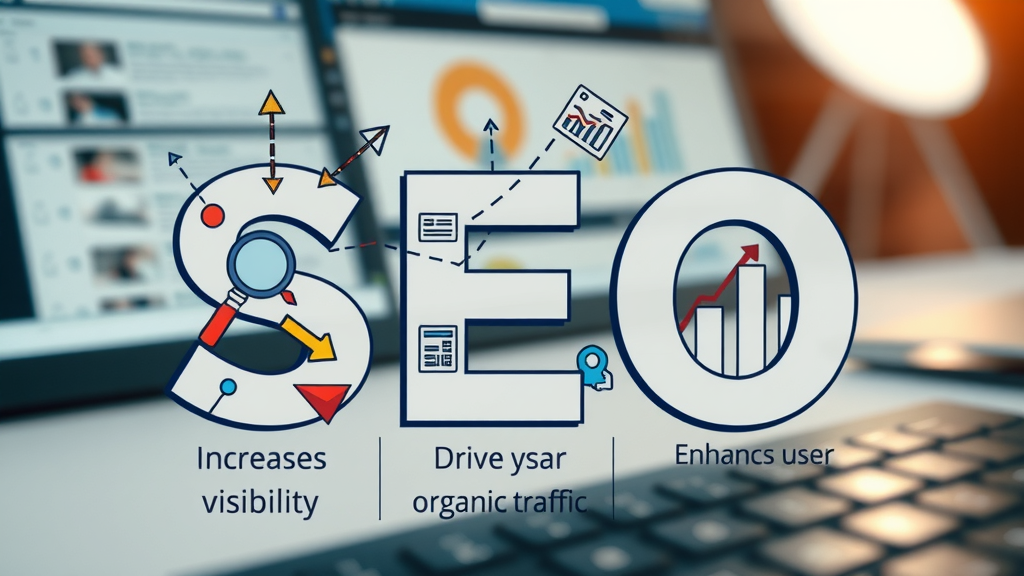In a digital landscape where visibility can make or break a business, understanding the seo acronym meaning is crucial. What does SEO stand for, and why does it matter? This article breaks down the foundational elements of Search Engine Optimization, illuminating its significance in driving traffic, enhancing online presence, and ultimately boosting success. Whether you’re a budding entrepreneur or a seasoned marketer, mastering SEO is your ticket to standing out in a crowded market. Dive in and discover how to navigate the intricacies of SEO with confidence!
What Does SEO Acronym Mean?
Definition of SEO Acronym
The seo acronym meaning refers to “Search Engine Optimization.” This is the process of enhancing a website’s visibility in search engine results pages (SERPs). Essentially, it involves various strategies and techniques to ensure that a website ranks higher when users search for relevant keywords.
SEO is crucial because it increases organic traffic, which is vital for any online business or presence.

The Evolution of SEO Acronyms
The realm of SEO has evolved significantly since its inception. Initially, SEO was primarily about keyword stuffing and link farming. However, as search engines like Google developed, the focus shifted to providing users with high-quality content and a better user experience.
Common acronyms associated with SEO include:
- SERP: Search Engine Results Page
- SEM: Search Engine Marketing
- PPC: Pay-Per-Click
The evolution of these terms reflects the broader changes in digital marketing strategies.
“SEO is not just about search engines. It’s about the user experience.” - Industry Expert.
Key Components of SEO
Understanding Search Engine Optimization
To grasp the seo acronym meaning, it’s essential to understand SEO’s key components, which can be broken down into the following categories:
- On-Page SEO: Refers to optimizing individual web pages to rank higher.
- Off-Page SEO: Involves actions taken outside of your website to impact your rankings.
- Technical SEO: Focuses on the backend structure of a website.
Each component plays a vital role in creating a comprehensive SEO strategy.
Common SEO Terms and Their Meanings
Understanding common SEO terms is crucial for anyone looking to delve deeper into the seo acronym meaning. Here’s a concise list of some essential terms:
| Acronym | Meaning |
|---|---|
| SEO | Search Engine Optimization |
| SERP | Search Engine Results Page |
| SEM | Search Engine Marketing |
| PPC | Pay-Per-Click |
| CTR | Click-Through Rate |

Types of SEO
On-Page SEO
On-page SEO pertains to the optimizations made directly on your website. This includes elements such as:
- Content quality: Engaging and relevant content.
- Title tags: Important for SEO; must be concise and include keywords.
- Meta descriptions: Brief descriptions that appear in SERPs.
Off-Page SEO
Off-page SEO focuses on activities outside of your website that impact your rankings. This can include:
- Link building: Gaining backlinks from reputable sources.
- Social media marketing: Promoting content through social channels.
Technical SEO
Technical SEO involves optimizing the infrastructure of your website. Key aspects include:
- Site speed: Affects user experience and rankings.
- Mobile-friendliness: Essential as more users browse on mobile devices.
- Secure Protocol (HTTPS): Improves trustworthiness and potential rankings.

SEO Acronym and Its Importance
Why Understanding SEO Acronyms Matters
Understanding the seo acronym meaning and related terms is crucial for anyone involved in digital marketing. It helps marketers make informed decisions and align their strategies with best practices. Knowledge of these acronyms facilitates better communication among team members and stakeholders.
Impact on Digital Marketing Strategies
SEO significantly influences digital marketing strategies. A well-executed SEO strategy can:
- Increase organic traffic.
- Improve brand visibility.
- Enhance user engagement.
“In digital marketing, SEO is the backbone of visibility.” - Marketing Authority.
SEO Acronyms in Action
Case Studies of Successful SEO Implementation
Many businesses have successfully leveraged SEO to enhance their online presence. For instance, a local bakery implemented local SEO strategies, resulting in a 50% increase in foot traffic.
Analysis of SEO Campaigns
Evaluating SEO campaigns helps identify successful tactics. Key metrics include:
- Organic traffic growth: Indicates effective keyword targeting.
- Conversion rates: Measures how well traffic converts to sales.
SEO Tools and Resources
Utilizing SEO tools can streamline the optimization process. Some popular tools include:
- Google Analytics: For tracking website performance.
- Moz: For keyword research and SEO insights.

Best SEO Practices
Developing an Effective SEO Strategy
An effective SEO strategy encompasses:
- Keyword research: Identifying target keywords.
- Content creation: Producing high-quality, engaging content.
- Regular audits: Assessing and refining your SEO tactics.
SEO Tactics for Improved Visibility
To improve visibility in search engines:
1. Optimize title tags and meta descriptions.
2. Use relevant keywords in content.
3. Build quality backlinks from authoritative sites.
Monitoring SEO Performance Metrics
Regularly monitoring performance metrics is vital for ongoing SEO success. Key metrics to watch include:
- Bounce rate: A high bounce rate may indicate poor content or user experience.
- Page load time: Affects user engagement and ranking.

Common Mistakes in SEO
Understanding Black Hat vs. White Hat SEO
Understanding the difference between black hat and white hat SEO is crucial. Black hat techniques may yield quick results but can lead to penalties and long-term damage to a website’s reputation. In contrast, white hat techniques focus on sustainable, ethical practices.
Avoiding Keyword Stuffing
Overusing keywords, known as keyword stuffing, can harm your SEO. Instead, focus on naturally incorporating keywords into quality content.
Importance of Quality Content
Quality content is the cornerstone of effective SEO. It’s essential to provide valuable, relevant information that addresses user queries.
Future of SEO and Acronyms
Emerging Trends in SEO
The landscape of SEO is ever-evolving. Emerging trends include voice search optimization and the increasing importance of user experience.
The Role of AI in SEO
Artificial Intelligence (AI) is playing a significant role in shaping SEO strategies. AI tools help analyze data and predict trends, making it easier for marketers to adapt their strategies.
“AI is revolutionizing how we approach SEO, making data-driven decisions more accessible.” - Tech Leader.

Conclusion: Key Takeaways on SEO Acronym Meaning
Summary of SEO Acronyms and Their Relevance
Understanding the seo acronym meaning and related acronyms is essential for navigating the digital marketing landscape. A solid grasp of SEO principles can greatly impact a business’s online success.
Final Thoughts on SEO Best Practices
To excel in SEO:
- Stay updated with current trends.
- Focus on delivering quality content.
- Regularly audit and refine strategies.

Additional Resources
YouTube Video on SEO Strategies
For further learning, check out this informative video on SEO strategies: SEO Strategies YouTube Video.
Key Takeaways
- SEO stands for Search Engine Optimization and is essential for online visibility.
- Understanding common SEO acronyms aids effective communication and strategy formulation.
- On-page, off-page, and technical SEO are critical components of a successful strategy.
- Regularly monitoring performance metrics helps refine SEO tactics.
- Quality content remains the backbone of effective SEO practices.
By mastering these concepts, you can navigate the world of SEO with confidence and drive your online success.
 Add Row
Add Row  Add
Add 



Write A Comment